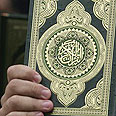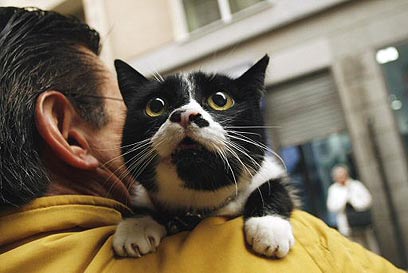
Islamic rulings prove: Allah loves animals
Questions sent to popular website and answers provided by Muslim scholars reveal dilemmas worshippers are faced with regarding their treatment of animals. The answers, all based on the Koran and traditions handed down by the Prophet, indicate a general position of consideration for animals
IslamOnline.net is a popular internet site which has been managed since its introduction in 1997 by the Qatar oil emirate. The directors of this site attempt to reply to the concerns of Muslim believers on the basis of the religious jurisprudence provided by a team of prominent jurists (muftis) who respond to the public’s queries.
A significant number of questions referred to jurists are associated with attitudes to animals, and reflect moral dilemmas in contemporary Islamic culture. The questions and answers presented on this site are indicative of the attitude towards animals in contemporary Islam and the manner in which Muslims deal with this subject in the broad complex of modern life. The site principally represents a Sunni ideological perspective because the muftis engaged by this site belong to this specific Islamic denomination.
- For the full article, click here
The IslamOnline.net site also includes a “fatwa bank” which is a compilation of important religious legal rulings collected and stored in the databank by editors of the site.
In the majority of rulings, an extensive reference to the particular problem is provided, while the fatwa is corroborated by religious law. These include traditional sayings of the Prophet Muhammad (Hadith) as well as verses from the Koran. The number of fatwas on the subject of animals is approximately 500 (out of a sum total of more than 12,000 fatwas in the entire database), thus offering a broad perspective on this topic.
The general picture that emerges from the entire corpus of rulings that appears on this site indicates positive behavioral norms towards animals. In the majority of replies, the jurists refer to the explicit prohibition on the torturing of animals for purposes of amusement, entertainment or sport intended for spectator pleasure (e.g., bullfighting in Spain).
Islam surpasses western animal rights groups
The replies are largely based on traditions that are considered reliable according to the jurists, and all of them appear in the familiar Hadith sources. For the most part, the traditions indicate the Prophet Muhammad’s positive attitude towards animals.
On the matter of compassion and mercy towards animals, the questions are numerous as well as diverse. Among these, I will principally focus on the perception of the prevention of cruelty to animals in the religion of Islam compared with the modern Western approach. Visitors to IslamOnline.net ask for a religious traditional basis that advocates a positive attitude towards animals in order to help refute voices from the West that claim that Islam is a cruel religion. In all responses concerning the prevention of cruelty to animals in Islam, there is an explicit dictate reflecting an attitude of compassion and mercy towards animals.
In his ruling on this issue, Sheikh Al-Qaradawi notes that Islam has anticipated contemporary pro-animal organizations by some 1300 years. The Islamic religion has in effect transformed charity and good deeds towards animals into an inseparable part of its faith. Furthermore, any deliberate harm or act of cruelty towards animals is considered an action punishable by the fires of hell.
In another response on the matter of the prevention of cruelty to animals in Islam, several fundamental rules underlying proper Muslim behavior towards animals are specified. According to the jurist who puts forward this response, these rules essentially surpass the laws that animal rights organizations in the West are trying to advance and legislate.
As for the last issue, the same response stresses that according to the Muslim legacy, the attitude towards animals principally involves treating them as creatures with feelings that experience sadness, misery, sorrow and more.
Islam prefers cats; dogs are impure
The practical aspect referring to the treatment of domestic animals and particularly pets such as dogs, cats, birds, fish or snakes, leads to another category of questions. We found in most of the answers on the site a preference for cats over other pets by Islam. This positive attitude is particularly prominent in the traditions handed down by the Prophet. In contrast, dogs are considered of inferior status and defined as impure animals, hence, an animal that should not be raised as a pet.
Grounds for this are presented in the tradition stating that angels do not enter a house where there is a dog. As indicated by another tradition, the Prophet allowed the killing of aggressive dogs along with other animals whose killing is permitted such as snakes, scorpions, black crows, mice, vultures, and any beast of prey that attacks humans.

Muslims can adopt me (Photo: Reuters)
At the same time, the site’s jurists are not always of one mind on the subject of dogs. One example is that of a woman who asks for help, and in fact permission, to inflict harm on a dog her husband is raising at home. She considers the animal an unclean beast and fears it might possibly lead to diseases among the children living at home.
In response to the question of whether she may poison the dog without her husband’s knowledge, the scholars strongly object. One of them asks her to first try and persuade her husband to remove the dog on the strength of the ritual laws which do not allow a dog to be kept as a pet in the house; however, she certainly does not have permission to harm the dog or poison it.
The muftis also approve the use of dogs for guiding the blind, security purposes, drug and bomb detection, and the search and rescue of people under collapsed buildings, etc. In effect, the jurists allow any form of raising or treatment of dogs as long as the dog serves the human and fills a clear role in assisting the human. However, it is forbidden to use a dog as a form of amusement, or to raise it at home as a pet. Markedly, there is a prominent contrast between raising a dog and a cat. There is essentially no reason not to raise a cat as a pet.
What to do with stray cats?
Among the religious rulings relating to environmental (hygiene) problems, the problem of dealing with stray animals frequently arises. Several visitors to the site pose queries regarding how the ritual laws deal with the natural increase of cats and dogs, and how to deal with this. The legal problem is connected to the legitimacy of performing sterilization processes.
In all the rulings submitted on this site, the muftis take into consideration this problem and sanction the sterilization of cats and dogs—as long as the procedure is performed in a professional and controlled manner and no harm is caused to the animals.
This ruling is of particular interest because, in the Hadith traditions, castration is explicitly forbidden. The jurists’ interpretations on this matter state that although the Prophet forbade the act of castration or the prevention of natural reproduction, the tradition’s intention regards, in their opinion, only humans.
Rigid stance towards other religions, compassion to animals
Much like other religions, Islam too attempts to carefully define the obligations of believers towards others in their world, including the attitude towards animals. In general, according to the rulings handed down on the IslamOnline.net site (the object of this study), the central Islamic jurisprudence grants many rights to nonhuman creatures. Believers are required to act according to the dictates appertaining to animals and for the benefit of the rights of these animals.
A guiding principle in Islamic ritual law is based on adhering to positive behavioral norms towards animals, preventing the suffering of animals, a concern for animal welfare, and the practice of compassionate and merciful behavior by any person who makes use of animals or encounters them. This principle underlies all the rulings appearing on this site and constitutes an integral part of the behavioral rules that Muslims are required to adhere to in their attitude towards animals.
Emphasis should be put on the fact that these fatwas do not qualify as laws that, if violated, make the transgressors punishable by the authorities. They should be viewed, rather, as recommendations or counsel regarding the proper behavior that is prescribed by the religious precept. It goes without saying that these rulings do not in themselves necessarily indicate the actual manner of behavior—this can only be established by a field study.
Nevertheless, the very act of approaching this site with these problems does indeed reflect the deliberations of visitors to this site in regard to the attitude towards animals. It can also be assumed that their making contact with the site is an indication of their acknowledgement of the authority of the muftis engaged by this site, whom they expect to indeed guide them along the right path. Finally, the distinctive nature of the Internet medium is such that the private question of a solitary individual is transformed overnight into the public domain and it is not possible to determine how it may ultimately resonate throughout the Muslim world, which numbers hundreds of millions of believers.
The general positive attitude that the site portrays in its approach to animals perhaps reliably reflects the Islamic tradition, but this should not mislead us in regard to other issues debated on this site. From a random examination of the many other religious rulings on the site database we were struck, for example, by the rigid stance of jurists regarding the attitude towards Christians and Jews, including the jurists’ view of what they perceive as the intentions of others to try and persuade Muslims to change their beliefs. With this extreme position of the jurists concerning these and other issues in mind, their relatively benevolent attitude towards nonhuman creatures is particularly noteworthy.
"The attitude towards animals in Islam according to Islamic rulings on the internet," Dr. Housni al-Khateeb Shehada, Lecturer in Islamic Art and Culture at the Levinsky College of Education and the Beit Berl Academic College
The full article was published in Animals and Society
To contact Animals and Society: [email protected]
Translation: Dan Schlossberg












